#Alisa Kwitney
Note
I've never heard of Miss Rachel Pollack, would it be possible to learn what kind of person was she through your memories? I'm sorry if it's already been asked, or if i offend you in any way. You don't have to answer if it's painful sir.
Absolutely -- to hear me, Alisa Kwitney and Rachel herself, listen the this BBC radio program, from 10:44 to 17:58
582 notes
·
View notes
Text
Stephanie Brown's Relationship to Gotham
I think it was pretty thematically fitting that Stephanie Brown was made champion of Gotham during Convergence. She's more "one with the city" than anyone thematically; Gothamite through and through. Gotham Gazette and Batgirl (2009) explore this pretty explicitly.
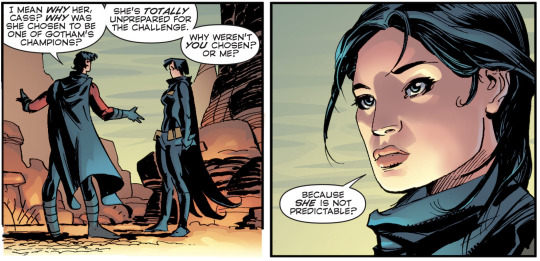

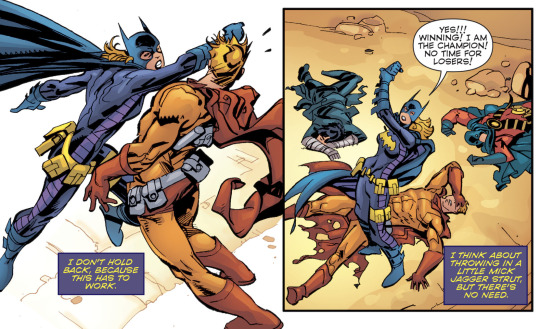
So that's Steph as Gotham's champion.
Here's Gotham Gazette:




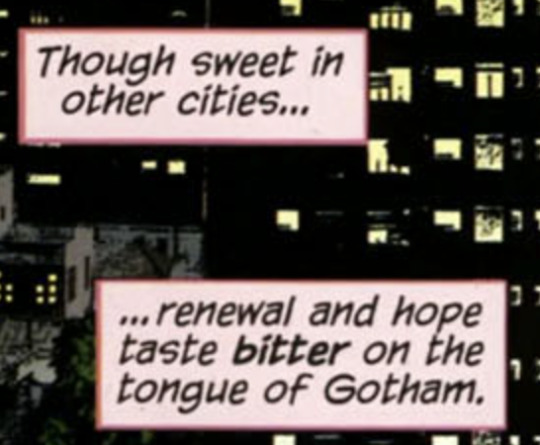
On the one hand, Steph quite literally feels Gotham because she has a penchant and talent for connecting with others and also because she's been through so so much that Gotham can possibly thrown at a person (or a vigilante). On the other hand, Stephanie represents the fighting spirit of a city with a "love for second chances" although "renewal and hope taste bitter [on its tongue]" (Gotham Gazette: Batman Alive). A huge part of her story is about honouring that second chance and inspiring hope. And that story isn't all rainbows and butterflies; it's set in Gotham- it's back-breaking and bittersweet. Batgirl Rising: Point of New Origin showcases this too.
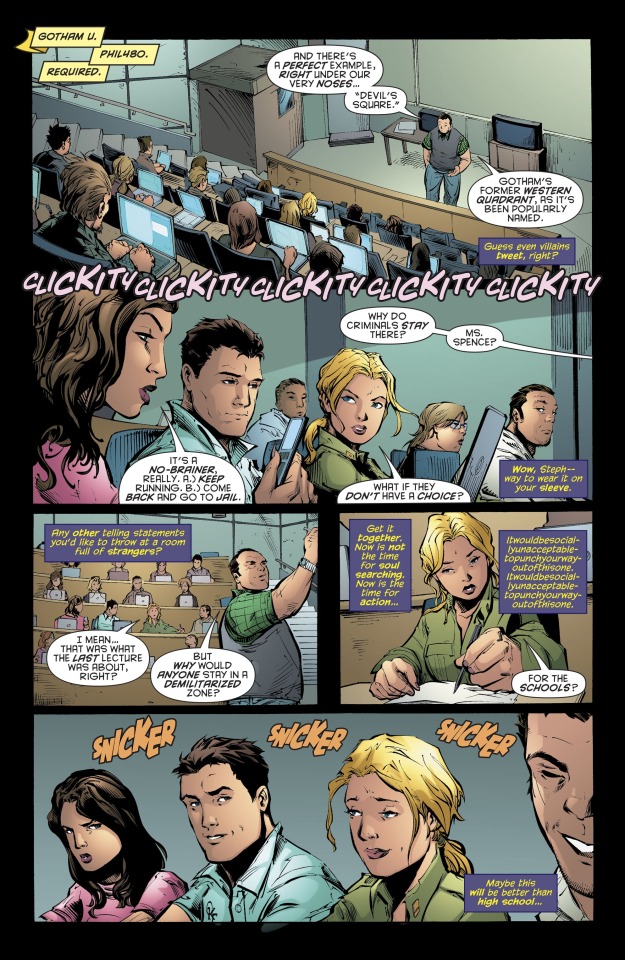

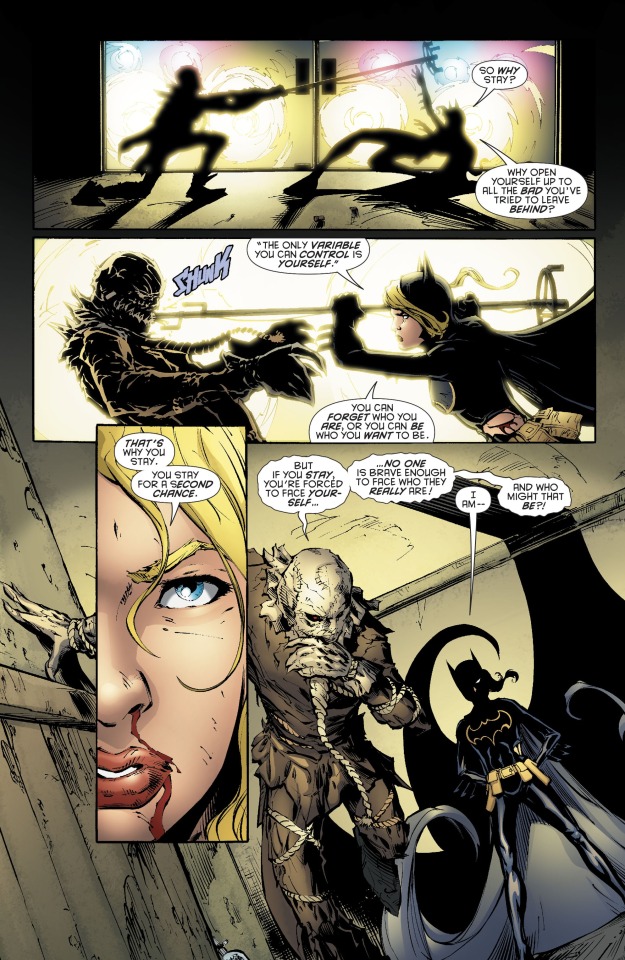
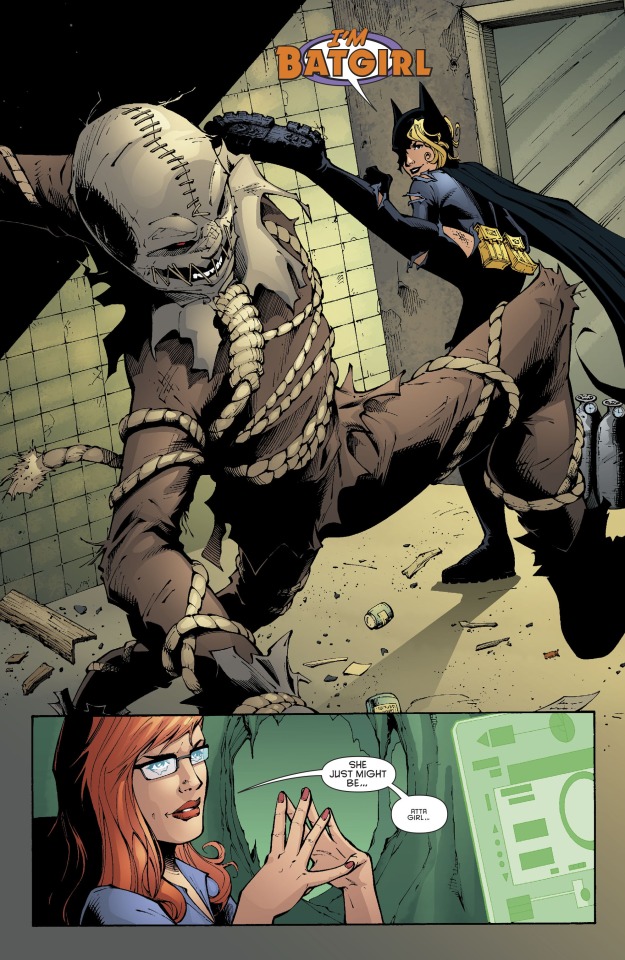
Not every Gothamite is a mass murderer, the majority are victims of circumstance who are either trapped or choose to stay- on the surface to help others but narratively to honour second chances, face themselves and grow. And Stephanie Brown is more than brave enough to do just that. She's a Gothamite through and through.
Sources: Gotham Gazette: Batman Dead, Gotham Gazette: Batman Alive, Batgirl (2009) #1-3, and Convergence: Batgirl
#stephanie brown is gotham#stephanie brown#batgirl#batgirl 2009#the spoiler#robin#batman#batman and robin#bryan q miller#batfam#bat family#dc comics#comics#fabian nicieza#alisa kwitney#steph brown
100 notes
·
View notes
Text
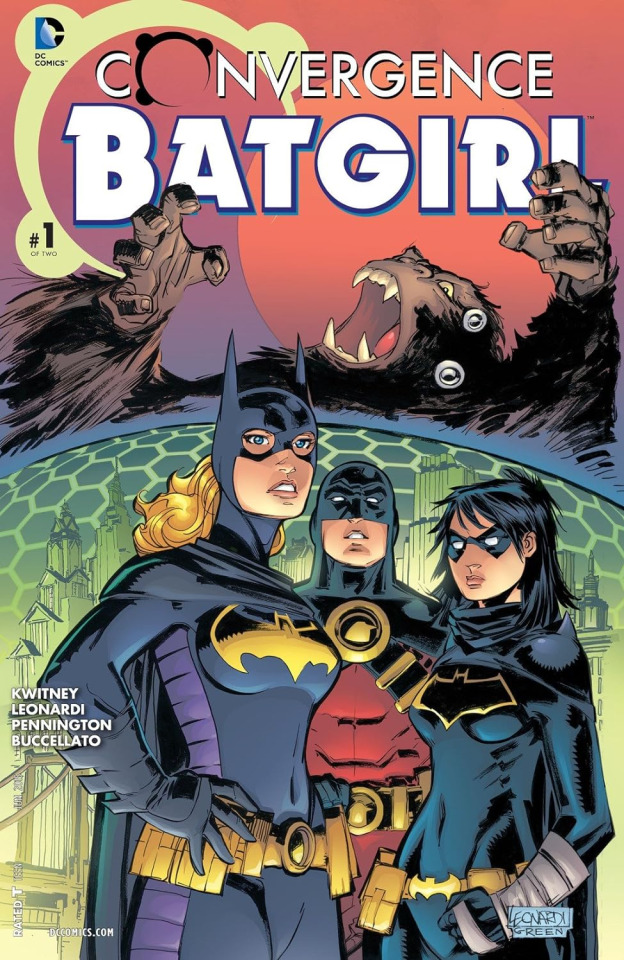
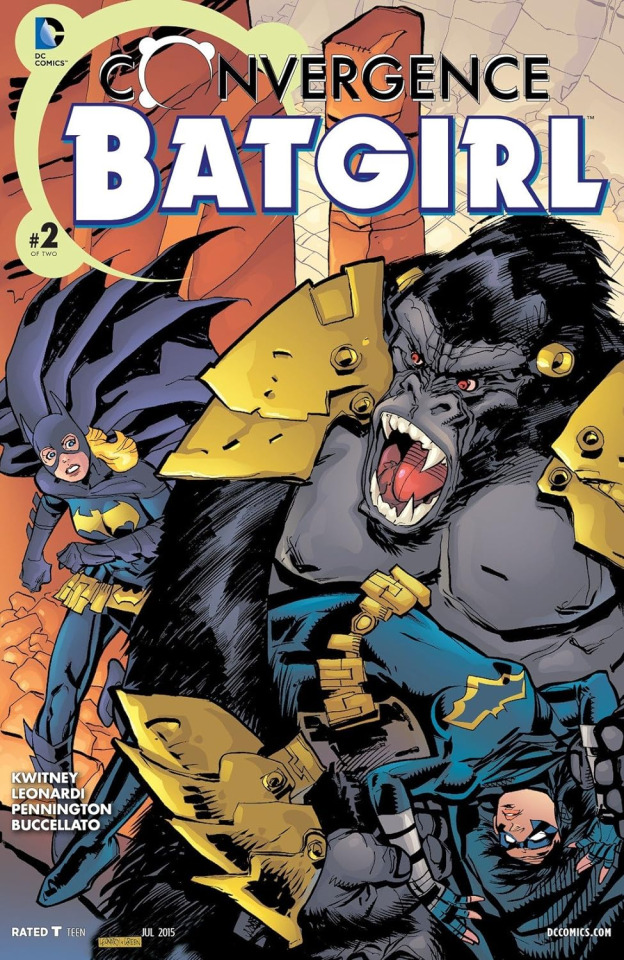
17 notes
·
View notes
Text

Creepshow Volume 2 Issue 4 by Nick Dragotta Alisa Kwitney Mauricet
#creepshow#the creep#nick dragotta#killer cart corral#alisa kwitney#mauricet#image comics#skybound#new comic book day#ncbd
8 notes
·
View notes
Text


The Dreaming #8:His Brother's Keeper
by Alisa Kwitney; Michael Zulli; Daniel Vozzo and Todd Klein
DC/Vertigoi
7 notes
·
View notes
Text
Novel Madness
Still reading, and apparently still blogging about it.
So this is what I read in March. Possible spoilers for the Vorkosigan Saga, and the Mercy Thompson and Peter Grant series, among others.
Jeffrey Cranor & Janina Matthewson: You Feel It Just Below The Ribs, completed March 2
So as you may recall, back in February, I had given up on Ruth Ozeki's A Tale From The Time Being, wasn't fond of Kristen Painter's Flesh And Blood, and was also not really liking the nonfiction book on Reddit I was reading.
I was somewhat tempted to just skip ahead to my reread of Memory, my favourite book in the Vorkosigan series. I mean, when I had started doing more frequent rereads, it had been after just such a string of subpar books, and I wanted to retrench and remind myself why I loved reading. Looking back in my records, I can't actually find that string of subpar books, but I can find about when I started doing the rereads--the fall of 2007, when I started doing a Wheel of Time reread, where every second book was a reread; it was the first time I reread the entire series (up to that point, which was Knife of Dreams). After that, my rereads went back to their more sporadic pace, until the spring of 2008 when I did an every-second-book reread of the Vorkosigan saga (the first of three such rereads in the next few years). And I kept doing every-second-book-a-reread for two years, at which point I slowed down to mostly every third book. By 2012 this was down to every fourth book, and there it seemed to stabilize. So it wouldn't be unprecedented for me to do my rereads more frequently, but the cycle has been stable for a while--I added in the alternation of author gender, the diversity slot, the trying-out slot…it would throw my cycle off now if I did the rereads more frequently. But don't think I wasn't tempted.
Anyway… I was looking for a male author, something that wasn't urban fantasy (because of the Kristen Painter), probably something that wasn't space opera (because Memory was still coming up)… I toyed with the idea of selecting something that might be "fun" (like John Scalzi's Agent To The Stars or the Doctor Who And The Krikkitmen book), but there were also books that I had been thinking "maybe" on for some time and hadn't yet picked up. And You Feel It Just Below The Ribs was one of them.
Many of you are likely familiar with Joseph Fink and Jeffrey Cranor's "Welcome To Night Vale" podcast, which I discovered relatively early (by current standards--maybe around the "Sandstorm" episodes?). I've see the show a couple of times when it came through (or near) Edmonton, I try to keep up on the podcast (though mostly I fail because I can't keep up with a bimonthly podcast schedule any more), and I have read all of the tie-in novels and the script books. The novels are decent, not great, but okay. And I have also tried out a lot of the other related podcasts--"Alice Isn't Dead" and "Within The Wires" are the ones I stuck with.
"Within The Wires" was always weird, and not every season was great, but it was an interesting combination of two conceits--one, that every season was done through "found audio", which included relaxation tapes with hidden messages, dictaphone recordings, answering machine messages, and museum audio guide recordings, among others. And two, that this all took place in an alternate history where, due to an early-20th-century upheaval called The Reckoning, the new regime had taken the drastic step of abolishing the family: breaking the emotional links between parent and child by altering their memories and raising the children in communal creches. (There's also a distinct shortage of male characters in the podcast, which is fine--at some point I'd even thought that men had been wiped out entirely, but there are occasional male characters mentioned now and then. And the new season features a male voice actor for the first time.) But we've never really gotten much detail about the Reckoning, because it was too far in the past, and nobody needed to talk about it much because it was just part of their common world. (Maybe in the season where we were following a woman who was part of a secret rebel group that did raise their own children, but even then we didn't get much.) So I was very interested in the novel that they came out with, in hopes that we would find out more about what the Reckoning actually was and how the change in society came about.
It's a bit of an odd novel--it has a sort of framing story of it being a found document, and has frequent footnotes. But I'm not clear why it was done like this. The document is the memoirs of a woman who was orphaned during the Reckoning--which seems here to have been a worst-case version of World War I that lasted until 1941 and did literally engulf the entire world, possibly with a worse flu pandemic as well. (This was published during Covid so that may have affected things a little.) The author, Miriam Gregory, ended up being influential to the whole post-Reckoning New Society practice of editing memories to remove parent-child bonds. She later got involved with the mysterious Institute from the first season, and there were some hints of the plot from the third (the political thriller told through dictaphone recordings). The footnotes mostly seem to be there to try to point out places where the editors of the document found stuff they were pretty sure was inaccurate. They quoted information from the official record and mentioned when there was no evidence of something existing or having happened at all. Which, okay, maybe this was people parroting the official history even with all its inaccuracies, as a method of showing how the truth had been hidden. But supposedly the publication of this document was being done by a group which was already not following the New Society party line, so why would they be so certain that this was wrong whenever it contradicted the accepted source of truth? It's not clear, and so it seems like they're just there to undermine the story whenever it gets too dramatic. It doesn't feel like an effective technique.
Overall it was a decent book, but flawed, and I felt like it could have covered more of the world than it did.
Lois McMaster Bujold: Memory, completed March 5
I have probably mentioned before that Memory is my flat-out favourite Bujold book. It's not an easy one to recommend to other people, though, because it may only work (and certainly works much better) if you've read all the previous books first. Jo Walton has talked about the "spearpoint theory", where a tiny sharp point can be made much more effective if you've had a lot of buildup to it. This book has a shaft consisting of all the Miles books and stories that came before. Obviously Mirror Dance, of course, the immediate prequel, but it has an especially poignant revisiting of "The Mountains of Mourning", as well as the reappearance of Duv Galeni from Brothers In Arms, and robust roles for Emperor Gregor Vorbarra, Delia Koudelka, Ivan Vorpatril, and Simon Illyan, who is central to the plot. It also has one of the dullest titles in the series, though it is relevant, not least because of the reference to Simon Illyan's eidetic memory chip.
The first part is the most painful, as Miles manages to lose most of what's important to himself through an attempt to keep it from slipping away. But I love almost every scene that takes place on Barrayar. It's such a treat just to see Miles coping with day-to-day life there (my favourite bit is still the convenience-store "Reddi-Meals!"), plunged back into a life he's been neglecting for years, that it doesn't even feel disappointing when it's over a third of a way into the book before the "real" plot really gets going. Because the shaft of that spear is still building up.
In later rereads, there are some bits I find fascinating. Like the worldbuilding details about the existence of Imperial Auditors, special investigators answerable only to the Emperor himself, that actually were never mentioned before in the series. But the way the native Barrayarans explain it to one Komarran feels completely organic, and they've known it all along, so surely these Auditors have been mentioned before? Nope, they're probably something that the author pulled out of her hat for this book (there were "auditors" mentioned in the framing story of Borders of Infinity, but I think they were just regular auditors, not Imperial ones). But if feels like they've always been in the background. (Maybe, if they were, they should have been mentioned in Barrayar somewhere? Well, whatever. Good enough.) Also, there was one relationship that blindsided me first time through, but now I can spot all the groundwork being laid for it all the way through. Very deft.
Steven Barnes: Zulu Heart, completed March 12
Next, according to my cycle, it was time for a book by a "diverse" male author. As I may have mentioned before, I seem to be much shorter on those than I am on female diversity, particularly on the black authors.
I first read Steven Barnes many years ago, at least in collaboration. His book with Larry Niven, Dream Park, has long been a favourite; I recall one day, after a stressful move between cities, that I spent just rereading the book from cover to cover. The sequels never hit quite the same spot, though, which may be why, although I did occasionally buy a Barnes solo book in a second-hand store, I had never actually gotten around to reading any of them. But they were there when I needed to draw from them for this slot. A couple of years ago I read his Lion's Blood, an alternate history novel about a world where African (and mostly Muslim) nations colonized the New World (which I believe they called Bilalistan), and they enslaved Europeans. (I don't recall if there was an in-universe explanation for the change in dominance--maybe the ever-popular Hyper-Virulent Black Death--or if it just turned out that way. There was something about Alexander The Great maybe going to Egypt…) One of the main characters was an Irish man named Aidan who was enslaved as a child near the beginning of the book, and separated from his sister; the other one was a black Muslim named Kai, son of a Wakil in Bilalistan. It probably covers a lot of slave-story tropes, but race-swapped, plus there's also drama an intrigue centered around Kai's family. It was an okay book, but I wasn't particularly planning on searching out the sequel; however, last summer at the When Words Collide convention in Calgary, I saw it on a table of "free to a good home" books, and decided to pick it up. And having basically exhausted pretty much all the other possibilities, I was perforce reading it next.
Once of the principles I mostly stick to with the diversity books is that I don't give up on them. (Maybe I should have done this with the Ruth Ozeki book last month, but I guess I didn't.) It's supposed to be about broadening my horizons, approaching different kinds of stories, etc. I've always been a little hit-or-miss with alternate histories; my perception, at least, is that a lot of them tend to focus on the same things--the American Civil War, the American Revolutionary War, World War II--all American stuff. This one is, at least, a little more creative, and is very black culture focused in a way that, frankly, Barnes's other books I read really weren't.
Plotwise, though, it's only okay; some threads are interesting, some I'm less interested in, and some seem to be a little rushed, as if he was trying to squeeze in plots from a third book the publisher had nixed. The back cover blurb seems to imply that the book is going to cover this world's version of the Civil War, but given that they're still colonies of overseas nations (Egypt and Abyssinia) it's really more like a Revolutionary War. And, spoilers, what there is of it is not a major part of the story. In that sense it's almost more like Diana Gabaldon's later books where the (American) Revolutionary War is going on, and it affects our characters, but it's not primarily about the war itself. And maybe this book would have benefited from being even longer to have that increased scope.
I do worry a bit about the reversed slavery idea--on the one hand, maybe it'll give some of us white people a better feeling for what the Africans suffered under slavery if we replace them with Europeans. The concepts that stuck with me were things like having white slaves given Arabic or African names rather than names from their own culture, and also all the African cultures being treated as distinct things while all the European cultures get jumbled together. But I also picture some people pointing at this and saying, "See? They'd do just the same as us if they were in charge!" Which may be true, but of course it doesn't say that, in our world, the slaves in America didn't suffer, and we're not living in that alternate world. It means that one group may not be inherently nobler than another, but that doesn't mean that they're not deserving of justice, or equity, or reparations. (I can also picture frothing white supremacists screaming that this the what the blacks want, and turning it into a story of white victimhood. Well, I guess we can't control what white supremacists are going to froth about.) It's not a bad thing, but it seems like it can be mischaracterized. (One novel I was working on, I have a setting with an area's native inhabitants being oppressed by intrusive colonials, and I was toying with the idea of having the natives be white, but I'm afraid it'd get read as anti-immigrant rather than anti-colonial, so I probably won't.)
Natalie Zina Walschots: Hench, completed March 16
After the long and somewhat topically heavy slavery book, I decided I was in the mood for something maybe a little lighter, and it was time to get back to a female author. My wife had recommended this Hench book to me, and nudged me about it a couple of times, and I decided to give it a go. I know that technically I do have my special slots for new authors (with the "try but feel free to give up if it does not spark joy" parameters), but if I never tried a new author outside of those slots, then it would take forever me to try all the ones I'm interested in, so I decided to let myself read this one.
The book is clearly set in a world with superheroes, and of course supervillains. I've read a lot of comics--mainly Marvel comics from the 60s through to the 90s (my attempt at a comprehensive read-through on Marvel Unlimited has just inched its way to the end of 1993, so I may be a little behind on the current state of the superhero genre, apart from the MCU stuff) but fewer actual prose novels. I suspect that the modern superhero novel, with its narrower focus, is more prone to examining superheroes in more depth, and frankly most of them tend to come out on the anti-superhero side of things, and at the very least turns them into more complex, flawed characters. The Annihilation Score tended to treat them as problematic; Brandon Sanderson's "Reckoners" series treats them as existential threats (admittedly, in that setting their powers literally drive them insane); and at best, they are severely flawed people who just happen to have powers, as in James Alan Gardner's "Sparks Vs. The Dark" series. Maybe it's a generational thing--in an age where the status quo is far from kind to the vast majority of those who are Millennials or younger, who are your sympathies with--heroes who fight to uphold the status quo, or the villains who subvert it? (Which is not too far off from the logic from that gets people to vote for Trump…)
Hench shows us mostly the villain side of the story, with superheroes mostly shown as overpowered thugs and walking disasters. We're mostly concerned with Supercollider, an example of the former, whose every brush with our protagonist leaves her damaged, and his longtime nemesis Leviathan, who lifts her up and makes her feel valued. I keep wanting to draw analogues with the heroes I'm familiar with--is Supercollider basically Superman? Leviathan seems more like Doctor Doom than anybody. Supercollider's partner Quantum Entanglement (a bit of an awkward name) seems more like a combination of Invisible Woman and Shadowcat than anything else. (I'm always low-key amused at superhero naming where they just silently have to avoid the names of real Marvel or DC characters, without seeming to. In my superhero stories I mostly tend to think that the real heroes are afraid of getting sued by the corporate juggernauts who own the trademarks on the fictional ones…) It got a lot darker than I was expecting, actually, but it was absorbing and I liked it a lot.
Patricia Briggs: Silver Borne, completed March 19
I had originally been thinking of something like Ann Leckie's The Raven Tower for my next book, but after Hench I wasn't feeling like it; instead I thought it might be time for another urban fantasy. I have started so many, and finished (or even caught up with) so few--the Dresden Files, for sure, and the Kelly Meding might be the only one. I find a lot of them appealing in the abstract, but it seems like they appeal to my wife more, so she's the one who reads then, gets hooked on the series, stays caught up, buys them in hardcover, etc. She has always been more of a fan of romance, and a lot of the female-authored urban fantasy seems like it's on a spectrum to paranormal romance. (The main difference, of course, is probably whether there's a single continuing protagonist, or a different romantic pairing every book.) Anyway, I'm in the middle of a lot of series, and it seems to take a lot to get me to the state where I get hooked and have to start reading them faster, so it can be years between books for me.
Patricia Briggs has, like many, split off a side series--her main series follows Mercedes "Mercy" Thompson, but there's also a "Charles & Anna" series which crosses over, and after the last Mercy Thompson book (Bone Crossed) left me a little underwhelmed, I had started those books, so the last Briggs I read was actually side series novel Cry Wolf. Apparently reading them in alternation is not a bad idea anyway, so I went back to Mercy for this one. I even remembered most of the characters, or at least was satisfied with the author's descriptions of them (a lot of minor werewolf pack members showed up, and I couldn't tell you for sure which ones we'd seen before or had character traits before this book).
The pacing was a little weird--there's basically three plot threads which show up at different times, which aren't really connected causally but do interact with each other, and the balance doesn't always work (like pack politics dominating everything else for a few chapters until we get back to our other plots), but it was better than Bone Crossed, at least. It's unfortunate, given how much urban fantasy I read, how little I enjoy the dominance politics of werewolf packs, and particularly the touchiness of Alphas. (Oh, no, we can't meet their gaze or undermine their authority or it's a challenge and they'll have to kill us. And they can't show any weakness or others will try to kill them.)
Next book in the series will be back to Charles & Anna, anyway. I am not yet really hooked on the series, but I'll keep going for now.
Lois McMaster Bujold: Komarr, completed March 22
Back to the Vorkosigans again, for Komarr. Like her other planet-named books, it takes place entirely on the planet in question (if we allow space stations in the same system to be close enough, anyway), the troubled vassal of Barrayar. Because the only current access to Barrayar comes through a wormhole in the Komarr system, and the earlier Cetagandan invasion of the planet was abetted by the Komarrans, Barrayar ended up conquering Komarr to secure its interface to the rest of the world. (I always wondered if it was only upon conquest of a second planet that Barrayar became a true empire, but I think they had emperors before that so probably not.) They've tried to be benevolent rulers since then, but we already saw in Brothers In Arms that there are those, like Ser Galen, that want to get rid of the Barrayaran yoke. And Aral Vorkosigan acquired the sobriquet of "The Butcher of Komarr" when a group of prisoners in his custody were executed--supposedly on his orders, but in fact it was an overzealous subordinate who Aral later killed.
Miles comes along to investigate a bizarre act of destruction--accident or sabotage, we don't yet know--where the "soletta array", a group of orbiting mirrors reflecting additional sunlight onto the cold, still-being-terraformed world (the world's population still lives in domed cities), has been damaged through collision with an off-course ship. He's mostly just shadowing older Lord Auditor Vorthys, the engineering professor who's analyzing the debris, and they end up staying over with Vorthys's niece Ekaterin Vorsoisson, who is our other viewpoint character in the book. Ekaterin has a highly unsympathetic husband, Tien, who has a secret shame, a hidden genetic disease called Vorzohn's Dystrophy. He also happens to be in charge of a small department of the terraforming effort.
I guess my biggest problem with this book is just that Tien and his department turn out to be directly related to the soletta disaster. I mean, think of it--the disaster happens, and an auditor is sent to investigate it. If it hadn't happened to be someone connected to Tien, the investigation might have gone nowhere, or taken a lot longer, because they wouldn't have had that extremely gratuitous link. It bugs me every time.
So the best part of the book is probably the introduction of Ekaterin, and her growth as a character through to the end of the book, where she strikes a decisive blow. And without it, we wouldn't have A Civil Campaign (or would, at least, have a much different book). But it is a dip in what would otherwise be a five-star run from Mirror Dance.
Shaun Barger: Mage Against The Machine, completed March 27
Catchy title, eh? That's probably part of why I picked it up in the first place, though I don't remember for sure. This is in my actual "trying a new author" slot, generally with permission to give up if the book doesn't grab me.
Essentially, it seems that the world ended at some point (2020?) when the machines/AIs rose up against the humans. The mages, who had been living in secret veiled communities for centuries, were hidden and thus not affected by this, though they're pretty sure that the humans were all wiped out. At least, that's what Nikolai, a young magically-talented officer (with a traumatic past) in the year 2120, has always been told.
Meanwhile, outside the veil, a young human cybernetically-enhanced woman named Jem, who remembers the machine uprising ten years earlier (she has her own tramatic past), and who mostly escaped because they were on the way to a colony on Venus at the time, is working as a courier, escorting a rare pregnant woman (unaffected by the fertility plagues the machines spread) through the fringes of Philadelphia.
The two stories go back and forth for several chapters in what seems like an attempt to sow confusion in the reader about the inconsistencies between the two versions of the timeline, which mostly led me to conclude that either these are literally parallel worlds, or that the mages are severely misinformed about the last century of history outside the veils. Or, presumably, most of them are misinformed but the ones at the top are all in on it and keeping the secret for their own reasons.
It seems like a bit of a hodgepodge. Part The Matrix, part Harry Potter (the mages have a sport named "flyball" that seems a lot of like Quidditch without broomsticks), part Brandon Sanderson/Brent Weeks (the flavour of the actual magic system), part Children of Men, part Wool (for the sheltered society ignorant of the world outside)… But I guess that means it's not too derivative, because of the variety of sources?
The biggest problem with it, really, is that the story clearly is not finished…but, in the five years since its release, no further books have come out. The author still seems to be actively posting on Instagram, and I found a Reddit post which said that as of two years ago the sequel was finished (and apparently there are supposed to be four books total), so I hazard a guess that the roadblocks are publishing-related. Like, his editor, Navah Wolfe, bought the first book for Saga Press, but moved on, so he might be editorially orphaned, leading to Saga passing on later books, so he'd have to be looking for a new publisher, or giving up and self-publishing (or just giving up). Always awkward--ask my wife who has two self-published sequels to the books that Scholastic published twenty-some years ago, because no other publisher would take them without rights to the first two. (Diana Rowland managed it somehow, but mostly it just doesn't work.) So I may hang on to this one and await further news (which presumably he'd post on Instagram or something…)
Ben Aaronovitch: Whispers Under Ground, completed March 31
Most of the urban fantasy series out there had female authors and female protagonists; I tend to call this the "post-Buffy" wave--before that, it felt like "urban fantasy" was more like Charles de Lint, with people in and around cities coming into contact with fairies and the like. Although stuff like Tanya Huff's "Blood Ties" series was also around back then, and that's clearly very close to what we call urban fantasy these days. Anyway. There are a few male authors as well, Jim Butcher the most famous, and Kevin Hearne, but they have a different flavour to them. And then there's Ben Aaronovitch, which is different again, being very British. Which is all just a way of saying that, while I normally try not to read too-similar books too close together, this doesn't really feel very much like the Patricia Briggs book I read a couple of weeks ago.
I'm a bit behind on this series--I read Midnight Riot (the North American retitled version of Rivers of London) some time ago, and Moon Over Soho more recently but still a while ago. But my wife was just reading the latest, Amongst Our Weapons, from the library, and apparently it's full of Monty Python references (in the chapter titles, if nothing else), and my eldest son was just reading Midnight Riot (apparently he'd heard that this series's magic system is vaguely similar to the system from the Ars Magica RPG we've been playing recently), so it felt like time to revisit it. My memory is of course a little fuzzy, but my overall impression is that this book is a little more police-procedural murder mystery than the previous two. Definitely there is a murder to solve, and there is a lot of interaction with other police (and an American FBI agent). Definitely a certain amount of underground (including sewers), as the title implies (so it's not just the London Underground). I enjoyed it and will have to try to revisit the series a little more frequently.
And that's it for the prose fiction books for March. For completeness I can also add in a graphic novel I squeezed in (literally just finished it before midnight on the 31st). See, one of the podcasts I've been listening to for a while is the "Endless" podcast, about the Sandman, cohosted by Lani Diane Rich and Alisa Kwitney. Kwitney, who was a former DC editor, particularly on Sandman itself, also apparently did a series for Ahoy Comics called "G.I.L.T.", which they were shilling on the podcast, so I thought I'd give it a try. I got my library to order what turned out to be a collection of the first five issues (I guess I'm not sure if there are more, but I wouldn't be surprised). "G.I.L.T." apparently stands for something like "Guild of Independent Lady Temporalists", though I'm not sure such a guild actually turned up… Anyway, two women, 70ish Hildy and 50ish Trista, get sent back in time to 1973, though Trista wasn't supposed to come along; they try to deal with their respective pasts, linked by a creepy cult-leader type that Hildy was engaged to and Trista's mother was a follower of. They're not supposed to be able to change anything, but they're also not supposed to both go back at once, so things get a little screwy. I wasn't 100% sold on it, but it was interesting.
And now I am actually reading The Raven Tower, but that'll be for next month's post.
#Lois McMaster Bujold#Vorkosigan#Ben Aaronovich#Patricia Briggs#Steven Barnes#Shaun Barger#Natalie Zina Walchots#Jeffrey Cranor#Janina Matthewson#Within The Wires#books#reading#Alisa Kwitney
4 notes
·
View notes
Text

Zatara and Zatanna by Mike Norton
10 notes
·
View notes
Photo
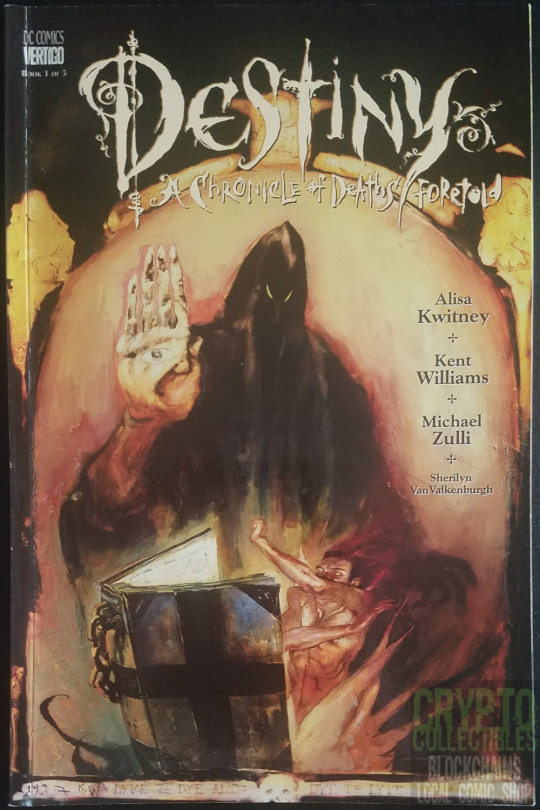
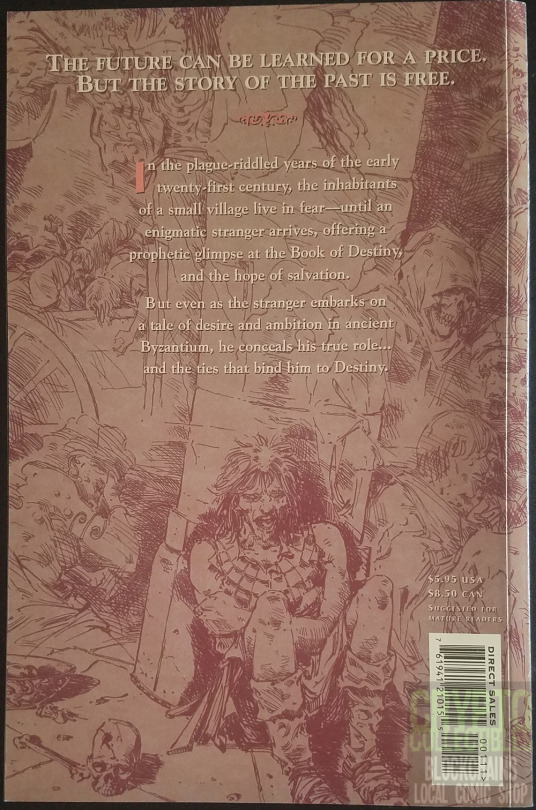
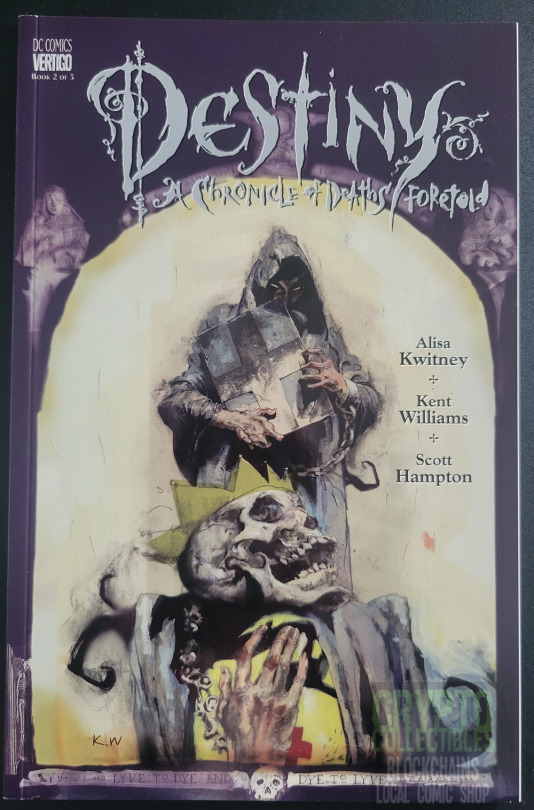
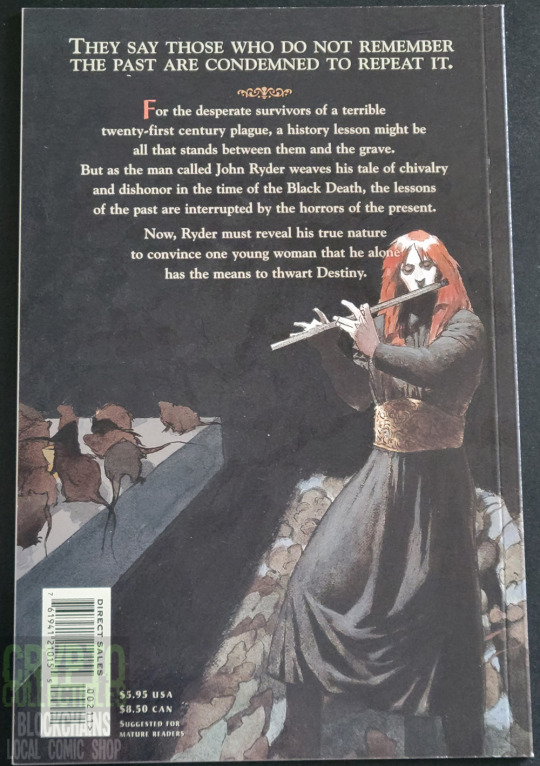
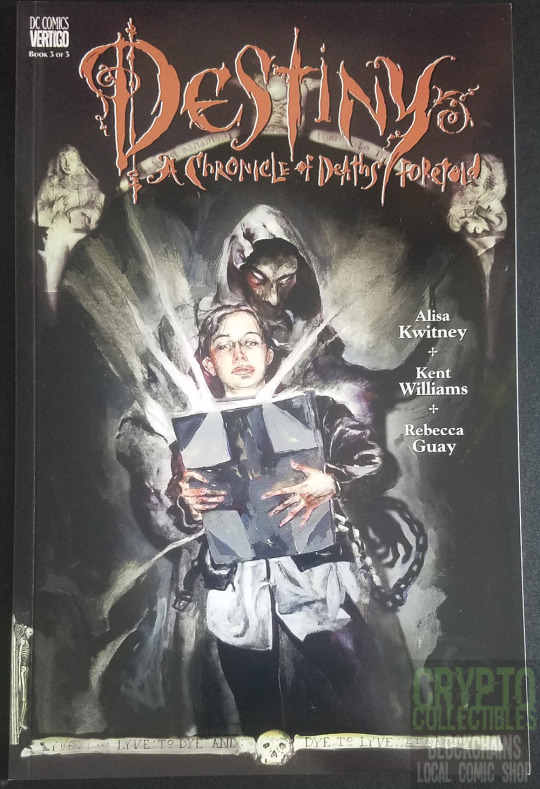
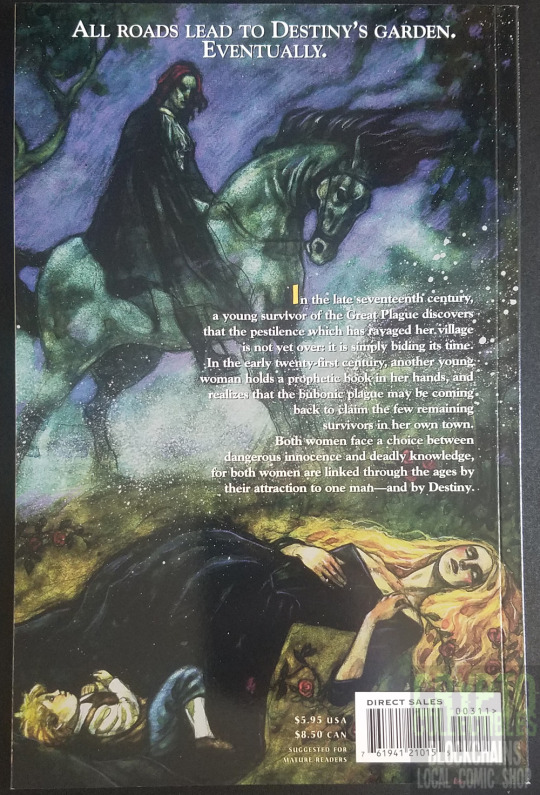
Destiny A Chronicle of Deaths Foretold 3 Issue Set (1997) by Vertigo / DC Comics
Written by Alisa Kwitney, drawn Kent Williams and Michael Zulli. Painted cover by Kent Williams.
#Destiny A Chronicle of Deaths Foretold#Destiny#The Endless#Vertigo Comics#DC Comics#1997.#2009#Alisa Kwitney#Kent Williams#Michael Zulli#Scott Hampton#Black Death#Comic Book Set#Etsy#Vintage Comics#Comic Books#Comics#Sandman#17th Century
8 notes
·
View notes
Text
Skybound Announces All-Stars Nick Dragotta, Alisa Kwitney, and Mauricet For Creepshow Vol.2 #4
Skybound Announces All-Stars Nick Dragotta, Alisa Kwitney, and Mauricet For Creepshow Vol.2 #4 #comics #comicbooks #horror #creepshow
Skybound has announced the all-star roster of creative teams behind Creepshow Vol. 2 #4, the latest installment of the smash-hit comic book anthology based on Greg Nicotero’s hit Shudder TV series produced and licensed by Cartel Entertainment. Season 4 of the hit Shudder TV series of the same name premieres October 13 on AMC and AMC+.
Creepshow Vol.2 #4 features stories by Nick Dragotta, Alisa…

View On WordPress
#alisa kwitney#comic books#Comics#Creepshow#Guillem March#horror#image comics#mauricet#nick dragotta#skinner#skybound
5 notes
·
View notes
Photo




The “missing” pages for The Wake, originally intended to follow page 16 in the 72nd issue to finalize the Sandman series. Written by Neil Gaiman, later drawn by Michael Zulli. I like that they at least once thought of the people NOT buying the hardback collection, and presented an affordable alternative for the floppy crowd, comic books’s salt of the earth.
4 notes
·
View notes
Text

an absolute GEM from a reply in the “letters to the editor” section (in this case, assistant editor alisa kwitney) of sandman #37
120 notes
·
View notes
Note
Hi there!
I've been working my way through all your old comics and comics adjacent to you (reading thru dead boy detectives now) and I'm absolutely loving it!
Anyways, my questions come to your word choice in the old comics. As someone who was not alive in the 90s, I'm curious if the wording chosen for certain things was deliberately provocative or just used wording popular at the time (ie the use of slurs or other racially charged language that is not used as often anymore).
I'm not trying to "cancel" you or anything, I'm just curious as a reader from the 2020s having a view of old media!
I could only answer that a word at a time. For example you'll find "dyke" used by a lesbian in A Game of You. It was used because every lesbian I knew at the time (1991) (and I knew a lot of London lesbians) used the word "dyke" as their descriptor of choice. The editors at DC were concerned it might be a slur, so sent the assistant editor of Sandman (Alisa Kwitney) down to a local NYC Lesbian bar to talk to NYC Lesbians, who pointed her at the flyers in the bar and the copies of Alison Bechdel's Dykes to Watch Out For, and told her that it definitely wasn't offensive. So we used it.
I don't ever recall trying to be deliberately provocative, if that helps.
2K notes
·
View notes
Text
... What lesson?
An analysis of Three Septembers and a January from Fables & Reflections by Neil Gaiman, Shawn McManus, Daniel Vozzo, Todd Klein, Alisa Kwitney and Karen Berger. (I, unfortunately, do not own The Annotated Sandman; everything I mention will be a part of my personal interpretation of this story)

What this short story does really well is illustrating the sibling dynamics between the Endless. Something that before was only shown at the start of Season of Mists. While the storyline itself can truly be seen as a stand-alone, it possesses many examples of how the interpersonal relationships interfere with how the siblings rule their realms. Dream shoves his principles aside as soon as Despair plays into Destruction's disappearance. A united front is constructed between the youngest siblings to compete against Dream. Death stands outside this, and her part in the Emperor's life is taken to be unwavering. Desire's attempts to claim the Emperor, is the action most connected to the continuing storyline; "But I'll make him spill family blood, I'll bring the Kindly Ones down on his blasted head...". This proclamation foreshadows in retrospect the conclusion of The Doll's House as it is takes place chronologically before the events in that comic, but this issue was released later. The reference to the Kindly Ones also gives a great example of how the amazing storyline planning can be seen, even in stand-alone short stories. Desire bringing a dead man back to life for this competition, also shows that they have the strongest drive to win from Dream and the least respect for Death's dominion.
On a deeper layer, the Endless' interactions are used to illustrate the interplay between the concepts they personify. This is not done subtly: "Dreams are 'nothing,' sister? Without dreams, there could be no despair."; An echo of Dream's defeat of Lucifer in A Hope in Hell. Very clearly, the ability to dream trumps despair, delirium and desire. In this story, it only yields to death and destiny. Yet the citation above shows that without dreams, the youngest three would not even have a realm. Dreams, apparently, have the capability to both create despair, delirium and desire, and to destroy them. This pattern can be taken much broader than shown in Three Septembers and a January.
The order that exists within the Endless suggests a power dynamic. As they are written, Gaiman seems to have presented them in order from most to least powerful. One can only exist because of its former. Death is bound by destiny, dreams would not exist if nothing was alive, despair/desire are fuelled by dreams, delight/delirium can be a direct consequence of achieving or rejecting the things that cause you desire or despair. Destruction was purposefully omitted in this list, his position between Dream and the twins seems strange. Destruction could have existed outside the Endless altogether; even without life, destruction is inevitable. He can be interpreted as an aspect of the second law of thermodynamics, which means that even without his actual presence, destruction would continue. A conclusion taken directly from Brief Lives. His complete existence and placement as part of the Endless serve as motivation for leaving, for abandoning his realm. The fact that he exists makes the fact that he leaves inevitable, creating the tragedy surrounding him; no other choice could have ever been made, him existing as himself is what damns him.
What still needs to be pointed out, is the capitalization of the word Lesson in Dream's speech bubble. This was an active decision by Klein, no other words starting with the letter 'L' are capitalized. Capitalization usually implies an (additional) importance connected to the word. In this case, it could imply the dual interpretation of the lesson learned within every Sandman comic: The lesson connected directly to the world of the Endless and the implications of the lesson on the "real" world. The conclusion about which lesson is learned in this story will therefore depend on who you are asking. The one I have taken away from it is told above. Despair might have missed it entirely. As with every good piece of literature, ultimately it is up to you.
#the endless#the sandman#brief lives#fables and reflections#dream of the endless#dream#despair#despair or the endless#morpheus#desire of the endless#delirium of the endless#three septembers and a january#sandman comics#sandman
65 notes
·
View notes
Text
The Year in Books and Graphic Novels 2022 and an analysis of 20 years of books and comics
January
1. Temple Alley Summer – Kashiwaba Sachiko, illustrated by Miho Satake, translated by Avery Fischer Udagawa
2. Dreams From My Father – Barack Obama, audiobook read by the author
3. X-Men Grand Design Vol. 1 – Ed Piskor
4. Vera Kelly Is Not a Mystery – Rosalie Knecht
5. All Thirteen: The Incredible Cave Rescue of the Thai Boys' Soccer Team – Christina Soontornvat, illustrations by Karen Minot
6. X-Men Grand Design Volume 2: Second Genesis – Ed Piskor
7. Year of the Rabbit – Tian Veasna
February
1. Deadly Class Volume 1: 1987 Reagan Youth – Chris Remender, Wes Craig
2. The Eye of the World – Robert Jordan
3. Pattern Master – Octavia E. Butler
4. X-Men Grand Design Volume 3: X-Tinction – Ed Piskor
5. The Confidence Men: How Two Prisoners of War Engineered the Most Remarkable Escape in History – Margalit Fox
6. Deadly Class Volume 2: 1988 Kids of the Black Hole – Rick Remender, Wes Craig
March
1. Once and Future Volume 1: The King is Undead – Kieron Gillen, Dan Mora
2. Once and Future Volume 2: Old English – Kieron Gillen, Dan Mora
3. Dragon Hoops – Gene Luen Yang
4. Ringworld – Larry Niven
5. Once and Future Volume 3: A Parliament of Magpies – Kieron Gillen, Dan Mora
6. Princess Jellyfish Volume 8 – Akiko Higashimura
7. Princess Jellyfish Volume 9 – Akiko Higashimura
8. The Sheepfarmer’s Daughter – Elizabeth Moon
April
1. Planetes Volume 1 – Makoto Yurimura
2. The Library of the Unwritten – A.J. Hackwith
3. Doom Patrol Volume 1: Crawling From the Wreckage – Grant Morrison, Richard Case
4. ODY-C Volume 1: Off To Far Ithacaa – Matt Fraction, Christian Ward
5. Conan of Cimmeria – Robert E Howard, Sprague de Camp, Lin Carter
6. Doom Patrol Volume 2: The Painting That Ate Paris – Grant Morrison, Richard Case, John Nyberg
7. Doom Patrol Volume 3: Down Paradise Way – Grant Morrison, Richard Case
May
1. Doom Patrol Volume 4: Musclebound – Grant Morrison, Richard Case, Kelley Jones, Mark McKenna, John Nyberg
2. Eragon – Christopher Paolini
3. The Promised Neverland Vol 1 – Kaiu Shirai, Posaku Demizu
4. Deadly Class Volume 3: 1988 Snake Pit – Rick Remender, Wes Craig
5. Once and Future Volume 4: Monarchies in the U.K. – Kieron Gillen, Dan Mora
6. The Dark is Rising – Susan Cooper
7. The Forest – Thomas Ott
8. The Left Hand of Darkness – Ursula K LeGuin
June
1. Deadly Class Volume 4: 1988 Die For Me – Rick Remender, Wes Craig
2. Arthurian Legends – Wace and Layamon
3. Dune – Frank Herbert
4. The Left Hand of Darkness – Ursula K LeGuin
5. The Lost Years of Merlin – T.A. Barron
July
1. The Secret To Super-Human Strength – Alison Bechdel
2. The Promised Neverland Volume 2 – Kaiu Shirai, Posaku Demizu
3. The New World – Ales Kot, Tradd Moore
4. Super Sentai Himitsu Sentai Gorenger – Shotaro Ishinomori
5. Spider-Gwen Volume 0: Most Wanted? – Jason Latour, Robbi Rodriguez
6. The Deed of Paksenarrion: Divided Allegiance – Elizabeth Moon
7. Ultimate Miles Morales Spider-Man Volume 1 – Brian Michael Bendis, Sara Pichelli, Chris Samnee
8. Giant Days Volume 1 – John Allison, Lisa Treimann
9. Giant Days Volume 2 – John Allison, Lisa Treimann, Max Sarin
August
1. Lockwood & Co. Volume 1: The Screaming Staircase – Jonathan Stroud
2. Ultimate Miles Morales Spider-Man Volume 2 – Brian Michael Bendis, David Marquez, et al
3. Ultimate Miles Morales Spider-Man Volume 3 – Brian Michael Bendis, David Marquez, et al
4. The Wheel of Time Book 2: The Great Hunt – Robert Jordan
5. Howl’s Moving Castle – Diana Wynne Jones
6. A Study in Scarlet – Arthur Conan Doyle
7. French Medieval Romances from the Lais of Marie of France – Translated by Eugene Mason
September
1. Pyongyang – Guy Delisle
2. Destiny: A Chronicle of Deaths Foretold – Alisa Kwitney, Kent Williams, et al
3. The Dead of Paksenarrion: Oath of Gold – Elizabeth Moon
4. Brave Chef Brianna – Sam Sykes, Selina Espiritu
5. Fledgling – Octavia E. Butler
6. At Death’s Door – Jill Thompson
October
1. We – Yevgeny Zamyatin, read by Toby Jones
2. The Witch Boy – Molly Knox Ostertag
3. 20th Century Boys Vol. 7: The Truth – Naoki Urasawa
4. 20th Century Boys Vol. 8: – Naoki Urasawa
5. Isaac the Pirate Vol. 1: To Exotic Lands – Christophe Blaine
6. Dungeon Zenith: Volume 4: Outside the Ramparts – Joann Sfar, Lewis Trondheim, Boulet
7. The Wheel of Time Book 3: The Dragon Reborn – Robert Jordan
8. 20th Century Boys Volume 9: Rabbit Nabokov – Naoki Urasawa
9. The Haunting of Hill House – Shirley Jackson
10. Isaac the Pirate Volume 2: The Capital – Christophe Blaine
11. 20th Century Boys Volume 10: The Faceless Boy - Naoki Urasawa
November
1. Gotham Central Book 1: In the Line of Duty – Ed Brubaker, Greg Rucka
2. Komi Can’t Communicate Vol. 1 – Tomohito Oda
3. The Promised Neverland Volume 3 – Kaiu Shirai, Posuka Demizu
4. Sleepless Volume 1 – Sarah Vaughn, Leila Del Duch
5. R.U.R. – Karel Capek, translated by David Wyllie
6. 20th Century Boys Volume 11: List of Ingredients – Naoki Urasawa
7. 20th Century Boys Volume 12: Friend’s Face – Naoki Urasawa
8. 20th Century Boys Volume 13: Beginning of the End – Naoki Urasawa
9. 20th Century Boys Volume 14: The Boy and the Dream – Naoki Urasawa
10. The Sandman Volume 1: Preludes and Nocturnes – Neil Gaiman, Mike Dringenberg, Sam Ketih, Malcolm Jones III
11. Dodger – Terry Pratchett
12. The Promised Neverland Volume 4 – Kaiu Shirai, Posuka Demizu
13. 20th Century Boys Volume 15: Expo Hurray – Naoki Urasawa
14. 20th Century Boys Volume 16: Beyond the Looking Glass – Naoki Urasawa
15. 20th Century Boys Volume 17: Cross-Counter – Naoki Urasawa
16. 20th Century Boys Volume 18: Everybody’s Song – Naoki Urasawa
17. 20th Century Boys Volume 19: The Man Who Came Back – Naoki Urasawa
18. 20th Century Boys Volume 20: Humanity in the Balance – Naoki Urasawa
19. Thursday Next book 2: Lost in a Good Book – Jasper Fforde
20. 20th Century Boys Volume 21: Arrival of the Space Aliens – Naoki Urasawa
21. 20th Century Boys Volume 22: The Beginning of Justice
22. The Promised Neverland Volume 5 – Kaiu Shira, Posuka Demizu
December
1. Thrawn Ascension: Book 1: Chaos Rising – Timothy Zahn
2. Crucial Conversations: Tools for talking when stakes are high - Kerry Patterson,
Joseph Grenny, Ron McMillan, Al Switzler
3. Sandman Volume 2: The Doll’s House – Neil Gaiman, Mike Dringenberg, Malcolm Jones III
4. My Favorite Thing Is Monsters – Emil Ferris
5. Please Don’t Step On My JNCO Jeans – Noah Van Sciver
6. The Sandman Volume 3: Dream Country – Neil Gaiman, Kelley Jones, Malcolm Jones III, Charles Vess
7. Winterfair Gifts – Lois McMaster Bujold
8. Sandman Book 4: Season of Mists – Neil Gaiman, Matt Wagner, George Pratt, Dick Giordano, Kelley Jones, P. Craig Russell
9. Sandman Book 5: A Game of You – Neil Gaiman, Sean McManus, Bryan Talbot, Colleen Doran
105 books and graphic novels in 2022! 34 novels (and 1 novella) and 70/71 graphic novels. I read one book twice for a book club. That’s 13 more than I read last year.
Now for totals from 2002 to 2022.
Totals:
2002 20
2003 86 – 7.16/month
2004 9
2005 84 – 7/month
2006 79 – 6.58/month
2007 58 – 4.83/month
2008 49 – 4.083/month
2009 51 – 4.25
2010 72 - 6
2011 60 - 5
2012 80 – 6.66
2013 50 – 4.16
2014 144 - 12
2015 92 – 7.66
2016 151 – 12.58
2017 138 – 11.5
2018 116 – 9.66
2019 96 - 8
2020 102 – 8.5
2021 92 – 7.66
2022 105 – 8.75
Including the years that I have incomplete data for (2002 and 2004 I only have 3 months of data), I read 1734 books and graphic novels from 2002 to 2022, 86.7 per year. If we leave off 2002, and 2004, I read 85.25 per year and an average of 7.89 books per month. I’ll post the graphic novels and regular books break down shortly.
3 notes
·
View notes
Link
Check out this listing I just added to my Poshmark closet: Vertigo Visions: Artwork From the Cutting Edge of Comics Hardcover Book w/DJ NEW.
0 notes
Text
My Year in Reading: 2023
Here is every book I read over the last year, listed in the order I read them. These are the books I read cover-to-cover and completed. Books I particularly enjoyed are in boldface. Books I’ve read multiple times are marked with an asterisk.
James Tiptree, Jr. - The Girl Who Was Plugged In*
Kazuo Umezz - The Drifting Classroom, Vol. 2
Vonda N. McIntyre - Screwtop*
Hitoshi Iwaaki - Parasyte 8
James Spooner - The High Desert
Ernest Hemingway - True at First Light
Adrian Tomine - The Loneliness of the Long-Distance Cartoonist
Jeff Lemire - Mazebook
Neil Gaiman & P. Craig Russell - Norse Mythology, Vol. 1
Veronica Roth - Arch-Conspirator
Annie Ernaux - Getting Lost
Seamus Heaney - The Burial at Thebes
John Connolly - Every Dead Thing
Alexander Theroux - The Enigma of Al Capp
Ed Brubaker & Sean Phillips - Fatale, Book Two: The Devil's Business
Ed Brubaker & Sean Phillips - Fatale, Book Three: West of Hell
Jason - Upside Dawn
Nick Hornby - Dickens and Prince: A Particular Kind of Genius
Scott Snyder & Jeff Lemire - A. D. : After Death
Kurt Cobain: The Last Interview and Other Conversations
Alisa Kwitney & Mike Norton - Mystik U
Kelly Barnhill - The Crane Husband
Steve Brodner - Living and Dying in America: A Daily Chronicle, 2020 - 2022
Hua Hsu - Stay True
Stephen King - Billy Summers
Heidi Julavits - The Folded Clock: A Diary
Salman Rushdie - Joseph Anton: A Memoir
Alberto Moravia - Agostino
Don Winslow - City on Fire
Paul Auster & Spencer Ostrander - Bloodbath Nation
David Milch - Life's Work: A Memoir
Larry McMurtry - Horseman, Pass By
Patti Smith - A Book of Days
Gahan Wilson - Fifty Years of Playboy Cartoons, Book Three: 1994 - 2008
Claire Keegan - Foster
Lucinda Williams - Don't Tell Anybody the Secrets I Told You
Fantasy & Science Fiction (Oct/Nov 2000)
Fantasy & Science Fiction (January 1972)
Michael Connelly - Dark Sacred Night
Denise Mina - Three Fires
Jon Fosse - Aliss at the Fire
Kristen Radtke - Seek You: A Journey Through American Loneliness
Bob Layton - Hercules: Prince of Power*
Gahan Wilson - Fifty Years of Playboy Cartoons, Book One: 1957 - 1973
Annie Ernaux - The Young Man
Julia Wertz - Impossible People: A Completely Average Recovery Story
Sean Murphy - Batman: Curse of the White Knight
Paul McCartney - 1964: Eyes of the Storm
0 notes